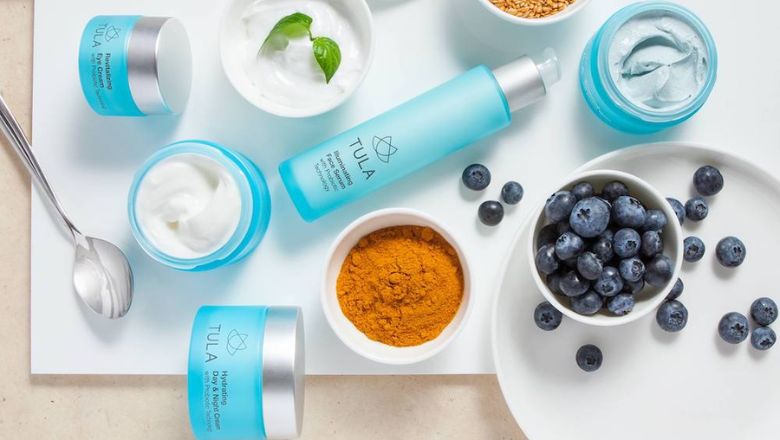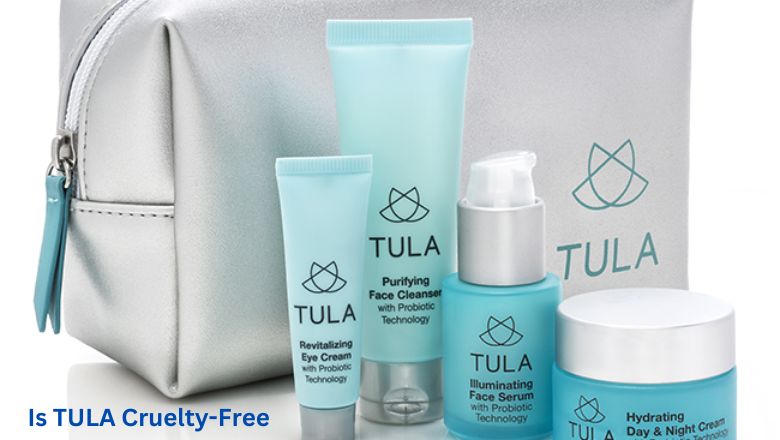Is TULA cruelty-free, vegan, and clean? We understand the importance of transparency when it comes to ethical beauty choices. In a market saturated with green-washing tactics and deceptive marketing ploys, our mission is clear: to separate fact from fiction so that you can make informed decisions for yourself.
Is TULA Cruelty-Free?
Yes, TULA is cruelty-free and goes beyond just abstaining from animal testing. The brand also ensures that their products are not sold in countries where animal testing is required by law, demonstrating a dedication to ethical practices. By prioritizing the well-being of animals, TULA sets a positive example for the beauty industry and shows that high-quality skincare can be achieved without harming innocent creatures.
TULA prides itself on using clean and effective ingredients in its products. This focus on transparency and safety further enhances the brand’s appeal to conscious consumers who value both ethical and sustainable choices.
Is TULA Owned By A Cruelty-Free Parent Company?
Many consumers are drawn to TULA’s promise of cruelty-free skincare products, but the reality is more complex when examining its parent company, Procter & Gamble. The involvement of a non-cruelty-free parent company raises questions about the true values and practices behind TULA’s branding.
Customers may be unknowingly supporting animal testing by purchasing from brands associated with companies like Procter & Gamble. This information sheds light on the importance of researching beyond just individual product labels.
The issue extends beyond TULA and highlights a broader concern in the beauty industry regarding transparency and accountability. As consumers continue to prioritize ethical sourcing and production practices, it becomes essential to look beyond marketing claims and consider the entire supply chain.
Choosing truly cruelty-free brands requires delving into not only their own policies but also those of their parent companies, revealing a more nuanced understanding of where our purchasing power truly lies in supporting animal-friendly initiatives.

It’s essential for consumers to be aware of the complexities within the beauty industry, especially regarding animal testing. Some parent companies may still engage in these practices, but it’s heartening to know that certain brands under their umbrella remain staunchly cruelty-free. This nuance allows consumers to make informed choices without compromising their ethical values.
It empowers individuals to align their purchases with their values while encouraging companies to uphold higher standards. By supporting cruelty-free brands within larger corporations, we contribute to fostering a culture of accountability and compassion in the beauty industry.
Is TULA Cruelty-Free Certified?
TULA’s cruelty-free certification by Peta speaks volumes about their commitment to ethical practices in the beauty industry. Some companies may choose not to pursue formal certifications, having this recognition from a reputable organization like Peta adds credibility to TULA’s claims of being cruelty-free. This certification signifies that TULA does not test their products on animals at any stage of production, from ingredients to finished goods.
Is TULA Sold In China?
Many cosmetic brands may succumb to the pressure of selling in China, despite its animal testing policies. TULA stands firm in its ethical stance against such practices.
By choosing not to sell in countries where animal testing is mandatory, TULA demonstrates a commitment to cruelty-free beauty and celebrates the essence of compassion-driven skincare. This decision not only reinforces the brand’s dedication to upholding high standards of ethics but also resonates with consumers who prioritize conscious consumption.
By staying true to its values and choosing integrity over expansion at any cost, TULA sets an example for other beauty brands looking to navigate the complexities of global markets without compromising on their core beliefs. In a world where profit often overshadows principles, TULA’s unwavering commitment to cruelty-free practices shines brightly as a testament to the transformative power of ethical choices within the beauty industry.

The fact that brands can still choose to test on animals in this market highlights the complexity of the issue. This means that consumers must remain vigilant and not automatically assume that all products from China are cruelty-free.
The evolving landscape of animal testing regulations in China adds a layer of uncertainty for those seeking ethical and cruelty-free options. It’s important for consumers to conduct thorough research into individual brands and their practices before making purchasing decisions.
Is TULA Vegan?
TULA isn’t entirely vegan, but it has made strides to cater to the growing demand for cruelty-free skincare. By offering a range of vegan options, they demonstrate a commitment to inclusivity and sustainability in their product line. This blend of animal-derived and plant-based ingredients speaks to the brand’s versatility and ability to appeal to a diverse customer base.
Is TULA Considered A Clean Beauty Brand?
TULA’s commitment to clean beauty goes beyond just labeling their products. They prioritize transparency by clearly listing all ingredients and avoiding harmful ones like parabens, phthalates, and mineral oil. Their products also undergo rigorous testing to ensure efficacy without compromising safety or environmental impact.
Dedication to both health and sustainability sets TULA apart in the overcrowded beauty industry, making them a trustworthy choice for conscious consumers seeking effective skincare solutions.
TULA’s use of probiotics and superfoods in their formulations further distinguishes them as a brand focused on promoting skin health from the inside out. By harnessing the power of natural ingredients, they deliver results without relying on harsh chemicals or questionable additives.

This holistic approach not only benefits the skin but also aligns with the broader clean beauty movement towards prioritizing overall well-being alongside outward appearance. In essence, TULA embodies the essence of clean beauty by providing products that are safe, effective, and environmentally friendly—all while promoting a healthy relationship between individuals and their skincare routines.
What Are Harmful Ingredients?
A harmful ingredient found in many personal care products is parabens. These chemicals, such as methylparaben and propylparaben, are often used as preservatives but have been linked to hormone disruption and possible links to breast cancer.
| Ingredients | Concerns |
|---|---|
| Parabens | Potential hormone disruption, allergenic potential |
| Phthalates | Reproductive and developmental issues |
| Formaldehyde | Skin irritation, potential carcinogenic effects |
| Sodium Lauryl Sulfate (SLS) | Skin irritation, oil-stripping potential |
| Sodium Laureth Sulfate (SLES) | Skin irritation, oil-stripping potential |
| Synthetic Fragrances | Allergenic potential, often not fully disclosed |
Is TULA Fragrance-Free?
TULA may not be entirely fragrance-free, but their conscious approach to offering both fragrance-free and synthetic fragrance-free products distinguishes them in the skincare market.
By providing options for those with sensitivities or preferences towards fragrance-free formulas, TULA demonstrates a commitment to inclusivity and catering to diverse consumer needs. This versatility allows individuals to customize their skincare routine without compromising on quality or effectiveness.
Is TULA Paraben-Free?
Yes, TULA is paraben-free. Parabens, commonly used as preservatives in cosmetics, have raised concerns due to their potential links to hormone disruption and other health risks. By formulating their products without parabens, TULA prioritizes the safety and well-being of their customers.
Is TULA Sustainable?
TULA’s dedication to sustainability goes beyond just their packaging. They also prioritize eco-friendly ingredients and manufacturing processes, ensuring that their products are not only good for your skin but also for the environment. By opting for responsibly sourced materials and utilizing sustainable practices, TULA sets a high standard in the skincare industry.

Their commitment to transparency further solidifies their reputation as a sustainable brand. Consumers can trust that when they choose TULA, they are supporting a company that values ethical practices and environmental consciousness.
With initiatives like the FSC label on product cartons, TULA showcases their efforts to make a positive impact on the planet while delivering quality skincare products to their customers.
How Do You Find Out If A Brand Is Cruelty-Free and/or Vegan?
The best way to determine if a brand is truly cruelty-free and vegan is to thoroughly investigate their website and product packaging. Look for clear statements that indicate the company’s stance on animal testing and the use of animal-derived ingredients. Some brands may even provide detailed information on their ethical practices, sourcing methods, and ingredient lists to assure consumers of their commitment to cruelty-free and vegan values.
If you’re unsure about a brand’s cruelty-free and vegan status, don’t hesitate to reach out directly to the company. Send them an email or message through social media asking specific questions about their production processes, ingredient sourcing, and any certifications they may hold. A transparent and responsive brand will gladly provide you with the information you need to make an informed decision about supporting their products while staying true to your values regarding animal welfare.
Many companies today are jumping on the ethical bandwagon, claiming to adhere to certain standards without actually doing so. As a consumer, it’s essential to dig deeper and verify these claims for yourself. Take the time to visit the company’s website and look for comprehensive information about their animal testing policies and ingredient sourcing.
One of the significant benefits of seeking recommendations from like-minded individuals is gaining access to a diverse range of cruelty-free and vegan brands that suit your preferences. These suggestions can come from friends, family, or online communities dedicated to ethical consumption. By tapping into this resource, you not only expand your options but also support the cruelty-free movement by promoting these brands to a wider audience.
Exploring alternative brands allows you to discover new products that align with your values while being mindful of the impact on animals and the environment. Embracing a community-driven approach to ethical shopping fosters a sense of solidarity among consumers striving for a more sustainable future.
Conclusion
Is TULA cruelty-free, vegan, and clean? has been thoroughly examined. There are aspects of the brand that align with these values, such as their commitment to using natural ingredients and not testing on animals. There are also some gray areas that may require further clarification.
Consumers looking to make informed choices about their skincare products should delve deeper into TULA’s sourcing and manufacturing practices. It is important for brands like TULA to be transparent and upfront about their ethical commitments in order to build trust with consumers.
FAQ`s
Is TULA Gluten-Free?
TULA offers a range of gluten-free products, it’s crucial to note that their manufacturers are not certified gluten-free. This distinction raises questions about potential cross-contamination risks during the production process. With machinery possibly in contact with gluten or its derivatives, individuals following strict gluten-free diets may want to exercise caution when considering TULA products.
Is TULA Soy-Free?
TULA may not explicitly advertise their products as soy-free, it’s essential to consider the possibility of soy ingredients being present in their formulations. As soy is a common allergen and widely used in many skincare products as an emollient or emulsifier, it wouldn’t be surprising if some TULA products contain soy derivatives.
Is TULA Nut-Free?
TULA’s website does not explicitly state that their products are nut-free, it is essential to consider the potential presence of nuts in their formulations. The lack of information on this aspect may suggest that TULA products could indeed contain nuts or be processed in facilities where cross-contamination is possible.
